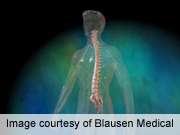(HealthDay)—For patients with painful diabetic peripheral neuropathy (PDPN), spinal cord stimulation (SCS) is a successful treatment, according to a study published online Sept. 11 in Diabetes Care.
Rachel Slangen, from the Maastricht University Medical Centre in the Netherlands, and colleagues randomized 36 PDPN patients to SCS in combination with best medical treatment (BMT; 22 patients) and BMT only (14 patients). If trial stimulation was successful, the SCS system was implanted. Definitions of treatment success include ≥50 percent pain relief during daytime or nighttime or "(very) much improved" for pain and sleep on the patient global impression of change scale at six months.
The researchers found that 59 percent of the SCS and 7 percent of BMT met the definition of treatment success (P < 0.01). Daytime and nighttime pain relief were reported by 41 and 36 percent in the SCS group, respectively, and by 0 and 7 percent in the BMT group, respectively (P < 0.05). In 55 and 36 percent of the SCS group, pain and sleep were "(very) much improved," while no changes were seen in the BMT group (P < 0.001 and P < 0.05, respectively). One patient from the SCS group died as a result of a subdural hematoma.
"Treatment success was shown in 59 percent of patients with PDPN who were treated with SCS over a six-month period, although this treatment is not without risks," the authors write.
The study was funded by Medtronic.
More information:
Abstract
Full Text (subscription or payment may be required)
Journal information: Diabetes Care
Copyright © 2014 HealthDay. All rights reserved.





















